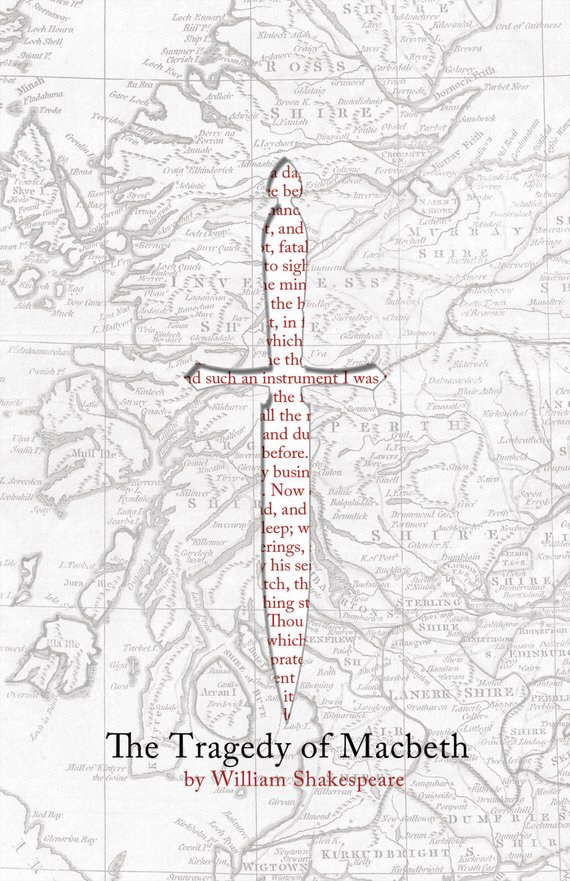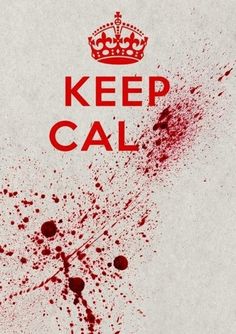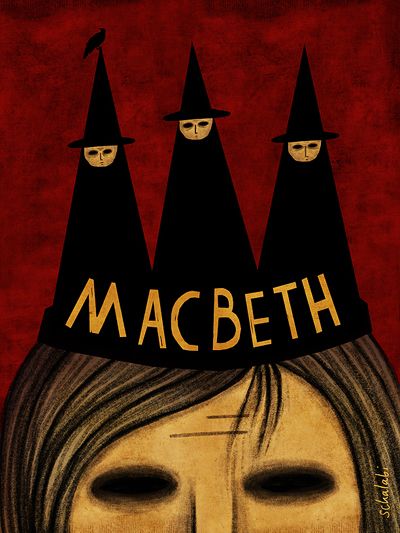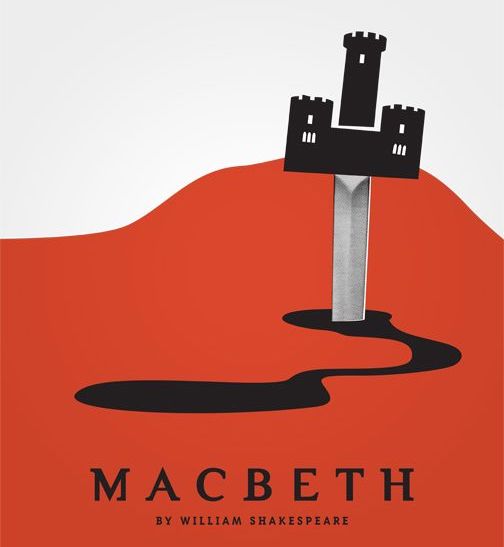|
MACBETHStay, you imperfect speakers, tell me more.By Sinel’s death I know I am thane of Glamis.But how of Cawdor? The thane of Cawdor lives,A prosperous gentleman, and to be king75Stands not within the prospect of belief,No more than to be Cawdor. Say from whenceYou owe this strange intelligence, or whyUpon this blasted heath you stop our way
With such prophetic greeting. Speak, I charge you.
WITCHES VANISH
BANQUO
80The earth hath bubbles, as the water has,
And these are of them. Whither are they vanished?
MACBETH
Into the air, and what seemed corporal
Melted, as breath into the wind. Would they had stayed.
BANQUO
Were such things here as we do speak about?
85Or have we eaten on the insane root
That takes the reason prisoner?
MACBETH
Your children shall be kings.
BANQUO
You shall be king.
MACBETH
And thane of Cawdor too: went it not so?
BANQUO
To the selfsame tune and words. Who’s here?
ENTER ROSS AND ANGUS
ROSS
90The king hath happily received, Macbeth,
The news of thy success, and when he reads
Thy personal venture in the rebels’ fight,
His wonders and his praises do contend
Which should be thine or his. Silenced with that,
95In viewing o’er the rest o’ the selfsame day,
He finds thee in the stout Norweyan ranks,
Nothing afeard of what thyself didst make,
Strange images of death. As thick as tale
Can post with post, and every one did bear
100Thy praises in his kingdom’s great defense,
And poured them down before him
ANGUS
We are sent
To give thee from our royal master thanks,
Only to herald thee into his sight,
Not pay thee.
.ROSS
105And, for an earnest of a greater honor,
He bade me, from him, call thee thane of Cawdor:
In which addition, hail, most worthy thane,
For it is thine.
BANQUO
What, can the devil speak true?
MACBETH
The thane of Cawdor lives. Why do you dress me
110In borrowed robes?
ANGUS
Who was the thane lives yet,
But under heavy judgment bears that life
Which he deserves to lose. Whether he was combined
With those of Norway, or did line the rebel
With hidden help and vantage, or that with both
115He labored in his country’s wrack, I know not;
But treasons capital, confessed and proved,
Have overthrown him.
MACBETH
Glamis, and thane of Cawdor!
The greatest is behind. (to ROSS and ANGUS) Thanks for your pains.
120( to BANQUO) Do you not hope your children shall be kings,
When those that gave the thane of Cawdor to me
Promised no less to them?
BANQUO
That, trusted home,
Might yet enkindle you unto the crown,
Besides the thane of Cawdor. But ’tis strange.
125And oftentimes, to win us to our harm,
The instruments of darkness tell us truths,
Win us with honest trifles, to betray ’s
In deepest consequence.
(to ROSS and ANGUS)Cousins, a word, I pray you.
BANQUO, ROSS, ANDANGUS MOVE TO ONE SIDE
MACBETH
130(aside) Two truths are told,
As happy prologues to the swelling act
Of the imperial theme.
(toROSS and ANGUS) I thank you, gentlemen.
(aside) This supernatural soliciting
Cannot be ill, cannot be good. If ill,
135Why hath it given me earnest of success,
Commencing in a truth? I am thane of Cawdor.
If good, why do I yield to that suggestion
Whose horrid image doth unfix my hair
And make my seated heart knock at my ribs,
140Against the use of nature? Present fears
Are less than horrible imaginings.
My thought, whose murder yet is but fantastical,
Shakes so my single state of man
That function is smothered in surmise,
145And nothing is but what is not.
BANQUO
Look how our partner’s rapt.
MACBETH
(aside) If chance will have me king, why, chance may crown me
Without my stir.
BANQUO
New honors come upon him,
150Like our strange garments, cleave not to their mold
But with the aid of use.
MACBETH
(aside) Come what come may,
Time and the hour runs through the roughest day
BANQUO
Worthy Macbeth, we stay upon your leisure.
MACBETH
155Give me your favor. My dull brain was wrought
With things forgotten. Kind gentlemen, your pains
Are registered where every day I turn
The leaf to read them. Let us toward the king.
(aside to BANQUO) Think upon what hath chanced, and, at more time,
160The interim having weighed it, let us speak
Our free hearts each to other.
BANQUO
Very gladly.
MACBETH
Till then, enough. (to ROSS and ANGUS) Come, friends.
EXEUNT
|
MACBETHWait! ____________________ I already know I am the thane of Glamis because I inherited the position when my father, Sinel, died. But how can you call me the thane of Cawdor? The thane of Cawdor is alive, and he’s a rich and powerful man. ____________________Tell me where you learned these strange things, and why you stop us at this desolate place with this prophetic greeting? Speak, I command you.
THE WITCHES VANISH.BANQUOThe earth has bubbles, just like the water, and these creatures must have come from a bubble in the earth. ___________________MACBETHInto thin air. Their bodies melted like breath in the wind. I wish they had stayed!BANQUOWere these things we’re talking about really here?Or are we both on drugs?
MACBETH
Your children will be kings.
BANQUO
You will be the king.
MACBETH
And thane of Cawdor too. Isn’t that what they said?
BANQUO
____________________
ROSS AND ANGUS ENTER
ROSS
___________________ Whenever he hears the story of your exploits in the fight against the rebels, he becomes so amazed it makes him speechless. ____________________
you fought the rebels you also fought against the army of Norway, and that you weren’t the least bit afraid of death, even as you killed everyone around you. Messenger after messenger delivered news of ______________
ANGUS
The king sent us _________ and to bring you to him. Your real reward won’t come from us.
ROSS
And to give you a taste of what’s in store for you, he told me to call you the thane of Cawdor. So hail, thane of Cawdor! That title belongs to you now.
BANQUO
(shocked) Can the devil tell the truth?
MACBETH
The thane of Cawdor is still alive. ____________________
ANGUS
_________________, but he’s been sentenced to death, and _______________. I don’t know whether he fought on Norway’s side, or if he secretly aided the rebels, or if he fought with both of our enemies. But his treason, which has been proven, and to which he’s confessed, means he’s finished.
MACBETH
(to himself) It’s just like they said—now I’m the thane of Glamis and the thane of Cawdor. And the best part of what they predicted is still to come. (to ROSS and ANGUS) __________________ (speaking so that only BANQUO can hear) ____________________
BANQUO
__________________ you might be on your way to becoming king, as well as thane of Cawdor. _________________. The agents of evil often tell us _________ in order to lead us to our destruction. They earn our _________________, but then they betray us when it will damage us the most. (to ROSS andANGUS) Gentlemen, I’d like to have a word with you, please.
ROSS, ANGUS, AND BANQUOMOVE TO ONE SIDE.
MACBETH
(to himself) So far the witches ___________________
(to ROSS and ANGUS)Thank you, gentlemen.
(to himself) This supernatural temptation doesn’t seem like ____________________ If it’s a bad thing, why was I promised a promotion that turned out to be true? Now I’m the thane of Cawdor, just like they said I would be.
But if this is a good thing, why do I find myself thinking about murdering King Duncan, ___________________? The dangers that actually threaten me here and now frighten me less than the horrible things I’m imagining. Even though it’s just a fantasy so far, the mere thought of ____________________. My ability to act is stifled by my thoughts and speculations, and the only things that matter to me are things that don’t really exist.
BANQUO
Look at Macbeth—he’s ____________________
MACBETH
(to himself)______________, perhaps fate will just make it happen and I won’t have to do anything.
BANQUO
Macbeth is not used to his new titles. They’re like new clothes: they don’t fit until you break them in over time.
MACBETH
(to himself) One way or another,_____________.
BANQUO
Good Macbeth, we’re ready when you are.
MACBETH
I beg your pardon; __________________. Kind gentlemen, I won’t forget the trouble you’ve taken for me whenever I think of this day. Let’s go to the king.
(speaking so that only BANQUO can hear) ____________________, _______________, let’s talk.
BANQUO
Absolutely.
MACBETH
Until then, we’ve said enough. (to ROSS and ANGUS) Let’s go, my friends.
________
|
The earth hath bubbles ie
|
|
|
|
|
|
|
Like bubbles pop suddenly into thin air, so too do the three witches suddenly vanish.
|
|
|
|
|
|
Strange images of death
|
|
|
|
|
i.e., the contorted bodies of Macbeth’s victims.
|
|
|
|
trusted home, ie completely trusted.
|
|
|
In deepest consequence, ie in matters of the greatest importance.
|
|
unfix my hair, ie make my hair stand up in fright.
Against the use of nature, ie unnaturally.
Present fears i.e., immediate fears of being killed in battle.
|











